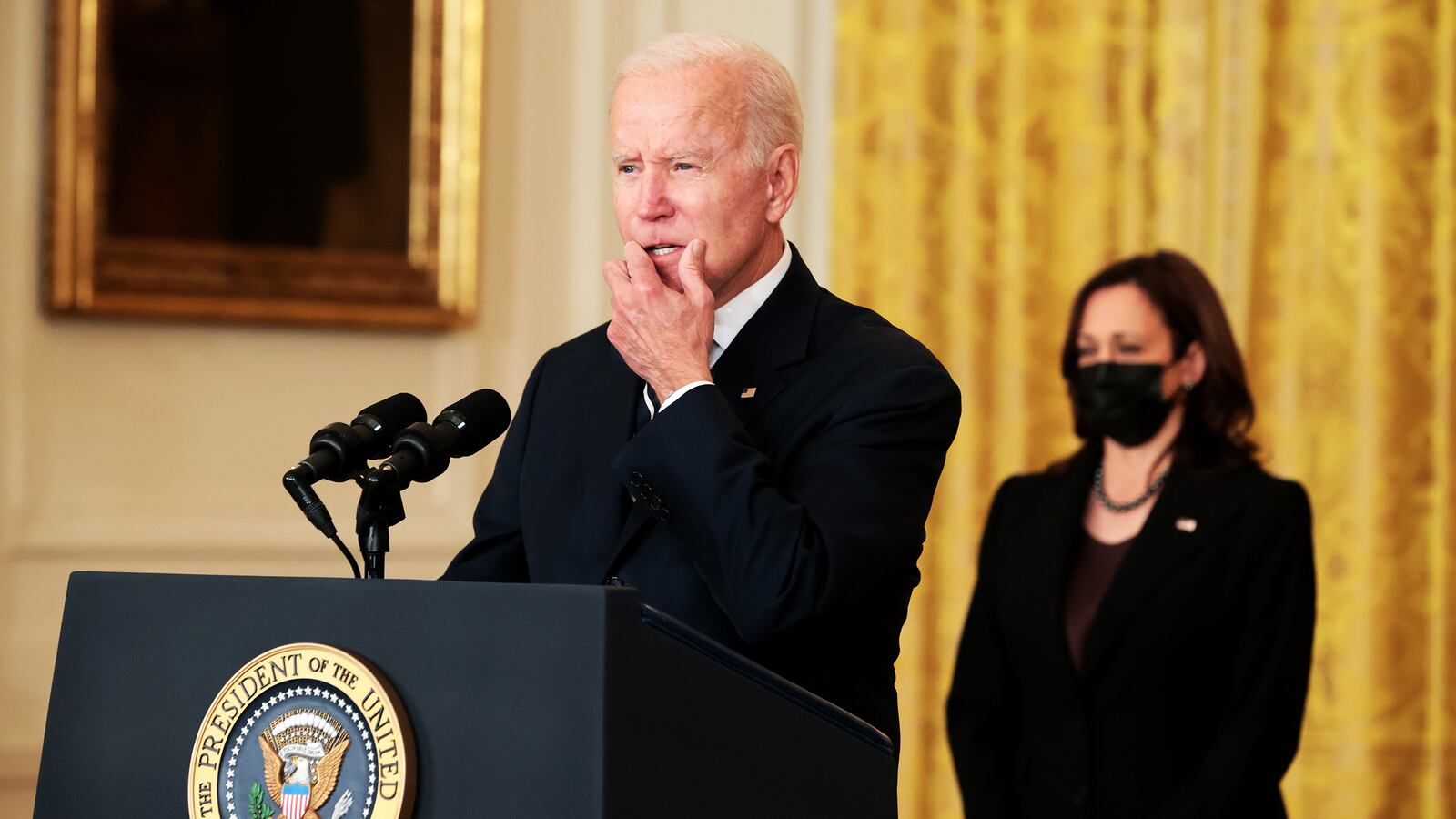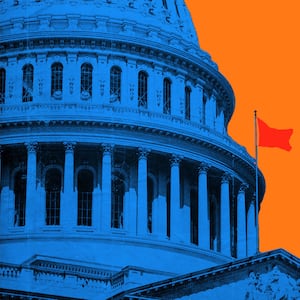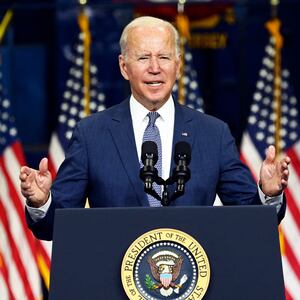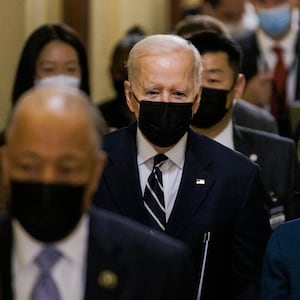When President Joe Biden released a comprehensive outline of his centerpiece social spending bill on Thursday, Speaker Nancy Pelosi (D-CA) had a simple message for House Democrats.
Don’t talk about what’s not in the bill, Pelosi said: Talk about what is in it.
There is, of course, a lot. The bill Biden outlined contains $1.75 trillion in investments that establish universal pre-kindergarten, vastly expand childcare, continue direct payments to most U.S. families, extend Medicaid coverage to millions of people, and direct some $550 billion toward fighting climate change—among many, many other provisions.
If enacted, the so-called Build Back Better Act would be comparable to the New Deal, an achievement and a fulfillment of decades of campaign promises. By any reasonable standard, Democrats would hardly need to be encouraged to talk about what is in the bill.
But what prompted Pelosi’s nudge is that most Democrats had hoped and worked for months to secure a bill twice the size of the one they’re getting. And when they convened to hear from Biden on Thursday, lawmakers had all just reviewed a framework that was shorn of numerous policies they’d pushed to include.
Those cuts—necessary to get the critical support of centrist Sens. Joe Manchin (D-WV) and Kyrsten Sinema (D-AZ)—were deep. A new national standard for paid leave, a personal priority of Pelosi’s and numerous other Democrats, was gone. So, too, was a long-awaited reform to allow Medicare to negotiate lower drug costs for seniors, a top-three campaign promise for Democrats. And tuition-free community college was out. As were a number of the most dramatic climate provisions.
Plenty of Democrats, who view this bill as their only real chance to make major policy in the Biden era, vented to the press and took not-so-veiled potshots at Manchin and Sinema for the concessions they extracted from their agenda. Some senators, like Sen. Kristen Gillibrand (D-NY), literally cornered Manchin and blocked him from leaving while they attempted to keep the paid leave program alive.
But it didn’t take long for Democrats to cycle through the five stages of grief and adopt the perspective that leaders had urged.
Though all Democrats had been “salivating” for a $3.5 trillion bill, said Rep. Emmanuel Cleaver (D-MO), “had that never been introduced, and someone introduced the scaled-back bill we have now… we would be jumping for joy to get $1.75 trillion.”
And plenty happily took Pelosi’s advice verbatim.
“I am so optimistic about this bill, because you could either talk about what's not in it, or you can talk about what's in it,” said Rep. Madeleine Dean (D-PA), a Progressive Caucus member. “We’re not getting a couple million, we’re not getting a couple billion, we’re getting $1.75 trillion.”
Rep. Brad Schnieder (D-IL), a leader in the center-left New Democrat Coalition, said he could “go on and on about all the wonderful things in the bill, which I think are much more important than things I wish we could get into this bill.”
The legislation is not final until it arrives on Biden’s desk for his signature. So, some lawmakers are focusing their messaging on the effort to get key aspects—namely the Medicare drug-pricing provision—in the bill. At a press conference Thursday, even Pelosi herself could not help but keep a candle lit for the paid leave program.
Even those who were effusive of the emerging framework still expressed disappointments about what got cut. Dean, for example, was most excited about a provision to establish free community college. But she insisted, “I do not have an affect, and this is sincere, of, ‘doggone, I wish this were in there.’”
“Take this win!” Dean said. “This is an incredible historic investment in our children, and the protection of our planet.”
With a vote on the $1.75 trillion legislation expected within days—and sealing the omission of some key programs—the dangers of getting hung up on what’s not in the bill are real.
Democrats came into power this year with sky-high expectations within their coalition to enact an expansive agenda. They fanned those hopes, and various advocates and interest groups who saw their priorities axed or watered down—particularly on immigration—likely won’t let Democrats entirely off the hook.
Compounding the expectations-management difficulty for Democrats was their failure to craft a name or branding for their social spending bill with enough time for it to stick. For months, lawmakers just called it a “reconciliation bill”—referring to the arcane process for passing it—or simply referred to the legislation by its price tag: $3.5 trillion.
Still, Democrats seem to be aware of the risks. And the quick shift from disappointment to sales mode might be a reflection of lessons already learned in the Biden era. Indeed, the Build Back Better Act is not the first instance of the party’s lofty agenda colliding with the political reality of their paper-thin majorities in Congress.
After taking office in January, Biden and congressional Democrats moved quickly to enact a $1.9 trillion COVID relief bill, titled the American Rescue Plan. It contained another round of pandemic stimulus checks, small business aid, and a new program to provide tens of millions of families with per-child monthly cash benefits and tax credits, hailed as the second coming of Social Security.
Those provisions were signed into law by Biden in March. But a number of Democrats focused on what got eliminated from the bill—namely an increase in the federal minimum wage, said Rahna Epting, executive director of the progressive advocacy group MoveOn.
“In focusing on the loss, we missed an opportunity to celebrate an incredible win,” Epting told The Daily Beast. “If we’re not thoughtful as progressives for how we maneuver this game of chess, we can come out too focused on what we didn't get, when in fact this is the largest investment in working people, and people of color, in the history of the U.S.”
There is near-universal agreement from Democrats on that score. The climate-change provisions alone had lawmakers gushing in the halls of the Capitol on Thursday about the virtues of the bill. Within the hundred billion-dollar buckets of funding in Biden’s outline were dozens of big and small wins that lawmakers have coveted for years, from vastly expanding funding for senior home care to the creation of a New Deal-inspired civilian environmental corps.
For example, Sens. Jon Ossoff (D-GA) and Raphael Warnock (D-GA)—who won runoffs in Georgia in January on promises to expand access to health care—are on the verge of bringing home a bill that expands Medicaid to GOP-run states like Georgia that had not elected to do it themselves.
With the 2022 midterm elections drawing closer, and Democratic control of Congress on the line, these are the kind of policy wins that could protect the party’s thin majorities.
At the same time, Democrats campaigned heavily in recent years on the very provisions that got cut. When voters ask why they were not able to realize some of those promises, Democrats will need to think very hard about a good answer.
Lawmakers sounded confident that what is in the current legislation is so impactful that voters would feel it, and give Democrats another two years in power to finish work on the rest of their agenda. Republicans, for their part, say they will make the social spending bill a centerpiece of their own 2022 campaigns, framing it as an inflation-driving and wasteful boondoggle that will reshape society for the worse.
“This is a major step in demonstrating that Democrats have a vision for our nation that’s going to uplift all Americans,” Schneider said. “If we demonstrate progress on that path, then I don’t think it’s an absolute conclusion we’re not going to be in the majority after this.”
Asked if voters who showed up for Democrats in 2020 would see this legislation as reason to elect Democrats again, Rep. Bonnie Watson Coleman (D-N.J.) was emphatic. “Is there more than enough to move us in the right direction, and communicate to those families and individuals… that we care about their needs?” she asked. “Yes, absolutely.”
Cleaver acknowledged there might be some Democratic voters who question why they would vote for them again if they don’t fulfill their promises. “Our responsibility is to let them know their voters were not wasted,” he said. “It’s a little shortsighted to conclude that we are failures because we couldn't get two people to work with us.”
Democrats who spoke with The Daily Beast held out hope that this legislation would represent a start, albeit a strong one, at getting their agenda passed—whether that is next year or under the hoped-for Democratic majorities in 2023.
But privately, many know they may not get another shot at legislation of this scope for a long time, given the historical headwinds of a midterm election year and the difficulty of passing major legislation beforehand. The party’s last major achievement, the Affordable Care Act, passed over a decade ago.
To Epting, Pelosi’s advice is sound: Democrats need to sell what they have.
“It would be a grave mistake,” Epting said, “to underestimate and under-sell this investment in the American people.”








